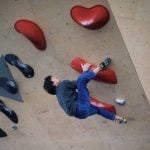Ask A Lawyer is a recurring column where attorney Jason Pill answers questions submitted by people who work in the climbing industry. Got a legal question that you’d like him to tackle about your gym, your employees, or anything else in the wide world of climbing? Submit your legal question here.

QUESTION: “As a gym owner, do I have to worry about an employee suing me (or filing for workers’ comp) for allegedly catching COVID-19 at the gym?”
PILL: Absolutely—there is no way around these risks.
In addition to the risk of lawsuits brought by your customers (see the cruise lines, for example), your gym also must worry about claims by your employees as they return to work after weeks of government-mandated lockdowns. Lawsuits already are being filed against employers related to COVID-19 and the number of claims is expected to rise significantly in the coming months. Unfortunately, climbing gyms will not be immune from these legal risks.
Public health officials have warned that employees returning to work will likely increase their risk of exposure to COVID-19, and it’s anticipated that some employees who become infected with COVID-19 after returning to work will ultimately blame their employer (including gyms) for contracting the virus. At that point, regardless of the merits, an employee can file a workers’ comp claim or lawsuit against the employer seeking redress, the merits of which will then be litigated (at further expense to the employer). Although these claims seem imminent, employees will find it difficult to hold an employer accountable for COVID-19-related illness or death.
Proving It
One of the big questions related to all this is: “How do you even prove when or where someone contracted COVID-19?”
It is a good question without a good answer. Sick employees will struggle to prove that they contracted COVID-19 at the climbing gym because COVID-19 is a highly contagious virus and common in society, making it hard for an employee to prove that exposure to the disease was an inherent aspect of the employee’s job or that the disease was contracted while at the gym. Even with a confirmed COVID-19 diagnosis and anecdotal evidence of fellow employees contracting the disease, employees will face significant challenges to establishing causation because many details about COVID-19 remain unknown, especially its incubation period. Similarly, because COVID-19 is highly contagious, it may be challenging to prove that the disease was contracted during employment at the gym, as opposed to any other interaction outside the gym (or even while recreationally climbing at the gym when not working). Whether the issue is being litigated through the workers’ compensation system or court system, causation likely will be the biggest hurdle for employees. In many instances, it will be an insurmountable hurdle.
Even if causation is an issue for an employee, it may not stop him or her from bringing a lawsuit or workers’ comp claim against the gym.
Differences Between Lawsuits and Workers’ Comp Claims
Claims against gyms alleging that an employee contracted COVID-19 at the gym will most likely go through the workers’ compensation system. In most states, workers’ compensation serves as the exclusive remedy for any work-related injuries and illnesses, which often is beneficial for the gym in terms of limiting exposure and litigation costs. In Florida, for instance, workers’ compensation is the sole remedy for occupational diseases—meaning that an employee is barred from filing a lawsuit—and an employee may only receive worker’s compensation if he or she shows that the risk of contracting the disease is inherent in his or her employment and that he or she contracted the disease at work. Each state also has damages caps that apply to workers’ compensation claims, which are much more limiting than the damages available to a plaintiff who files a negligence claim.
Given the proliferation of workers’ compensation claims already being seen around the country, several state workers’ compensation boards have already considered and denied workers’ compensation claims based on contracting COVID-19 because of a lack of conclusive proof connecting the illness to the employment. Some states, like New York, however, have considered amending workers’ compensation statutes and regulations to make it easier for employees to prove that they contracted COVID-19 while at work. And in other states, like California, governors have issued executive orders easing the employees’ burden of proving that they contracted COVID-19 while at work and in the course of their employment. Notably, workers’ compensation is handled on a state level, and each state will have its own regulations and nuances.
An Exception to the Rule
Although workers’ compensation provides employees with the sole remedy for work-related injuries and illnesses, most states have an exception to this rule when the employer has deliberately harmed the employee or, in some states, acted grossly negligent. Because workers’ compensation claims usually cap damages based on an employee’s wages, many employees will attempt to avoid the workers’ compensation system under this exception and file a civil suit in court to request greater damages and hope to obtain a trial in front of a jury, which could be sympathetic toward a sick employee having to sue his or her former employer.
[adning id=”19811″]
For example, Walmart recently was named as a defendant in a wrongful death lawsuit brought by the family of a former employee who died of complications related to COVID-19. The lawsuit is attempting to get around the limitations of the workers’ compensation system—and damages caps—by alleging that Walmart engaged in intentional conduct by not protecting its employees. Walmart is expected to seek dismissal of the lawsuit by arguing that the issue should be resolved through the workers’ compensation system. Similar to Walmart, most gyms likely would prefer that workers’ COVID-19 claims proceed through the workers’ compensation system.
The Importance of Intent
Generally speaking, an employee can file a COVID-19 claim in court and circumvent the workers’ compensation system only if he or she proves that:
- The gym deliberately intended to injure the employee, or
- The gym engaged in conduct that the gym knew was virtually certain to result in injury or death to the employee, the employee was not aware of the risk because the danger was not apparent, and the gym deliberately concealed or misrepresented the danger so as to prevent the employee from exercising informed judgment about whether to perform the work.
Under this standard, employees most likely cannot file a suit for contracting COVID-19 when returning to the gym because the employee will probably lack proof that the gym desired that the employee would contract COVID-19.
Likewise, because many who contract COVID-19 exhibit no symptoms or recover without any significant medical complications, employees will face an uphill battle in proving that the gym was “virtually certain” that the employee would get injured or die from contracting the virus.
Finally, the ubiquitous media coverage on COVID-19 will make it difficult to prove that the employee was unaware of the health risks associated with COVID-19.
Steps a Gym Can Take
Despite the challenges in holding gyms legally accountable for COVID-19 illnesses, many employee lawsuits have already been filed, and more are anticipated as employers reopen their businesses. Amid these uncertainties and anticipated lawsuits, gyms should stay informed on the constantly updated CDC and OSHA guidelines that apply to them, including, where applicable, guidelines for fitness centers.
As of now, OSHA has issued many industry-specific reopening guidelines, but nothing yet for fitness centers or gyms (for reference, the guidelines for reopening retail establishments, found here, likely are the most applicable to gyms). Many states, however, have issued gym-specific guidelines for reopening within that state, and these guidelines cannot be ignored. Additionally, the Climbing Wall Association recently released a guide for climbing gyms’ reopenings.
Following relevant guidelines will help gyms demonstrate that they took necessary steps to protect employees from the virus. Gyms also should document all of these practices, including the dates on which they were implemented, to help limit their potential liability from employees (and customers). Even in states that require an employee to prove gross negligence to bypass the workers’ compensation system (a lower standard), employees and their family will find it difficult to prove that gyms were negligent if they followed the applicable guidelines and implement reasonable safety measures.
Note: This column offers general advice and is not intended to be used as direct legal counsel. Gym owners should consult a lawyer for their facility’s specific legal matters. Pill can be contacted directly here.














